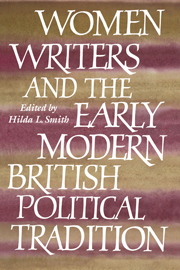Book contents
- Frontmatter
- Contents
- List of contributors
- Preface
- Introduction: Women, intellect, and politics: their intersection in seventeenth-century England
- Part I Women's political writings, 1400–1690
- Part II Women's political and philosophical writings, 1690–1800
- Introduction to Part II
- 5 Astell, Masham, and Locke: religion and politics
- 6 The politics of sense and sensibility: Mary Wollstonecraft and Catharine Macaulay Graham on Edmund Burke's Reflections on the Revolution in France
- 7 Mary Wollstonecraft on sensibility, women's rights, and patriarchal power
- 8 Emilie du Châtelet: genius, gender, and intellectual authority
- Part III The intellectual context and economic setting for early modern women
- Part IV Early modern legal and political prescriptions for women
- Conclusion: women's writing, women's standing: theory and politics in the early modern period
- Index
8 - Emilie du Châtelet: genius, gender, and intellectual authority
from Part II - Women's political and philosophical writings, 1690–1800
Published online by Cambridge University Press: 04 August 2010
- Frontmatter
- Contents
- List of contributors
- Preface
- Introduction: Women, intellect, and politics: their intersection in seventeenth-century England
- Part I Women's political writings, 1400–1690
- Part II Women's political and philosophical writings, 1690–1800
- Introduction to Part II
- 5 Astell, Masham, and Locke: religion and politics
- 6 The politics of sense and sensibility: Mary Wollstonecraft and Catharine Macaulay Graham on Edmund Burke's Reflections on the Revolution in France
- 7 Mary Wollstonecraft on sensibility, women's rights, and patriarchal power
- 8 Emilie du Châtelet: genius, gender, and intellectual authority
- Part III The intellectual context and economic setting for early modern women
- Part IV Early modern legal and political prescriptions for women
- Conclusion: women's writing, women's standing: theory and politics in the early modern period
- Index
Summary
As Sarah Hanley's essay on Christine de Pizan and the Salic law demonstrates (chapter 13), France has a long tradition of women writing and writing on political subjects. In England the Civil War and Glorious Revolution increased the numbers and status of writers on many kinds of topics; Louis XIV's reordering and consolidation of monarchical authority had the opposite effect in France. In the seventeenth and eighteenth centuries the French government gained more control over publications on all subjects whether by women or men. Every book required the “Approbation,” a testimony to the value of the work, and the “Privilège du roi,” royal permission granted to the printer to undertake publication. Permission was refused to any book deemed critical of the government, the established church, or offensive to the royal definition of “morality.”
It was in this context that Emilie du Châtelet became the principal woman “physicien [physicist],” and “géomètre [mathematician]” of the first half of the eighteenth century. Ironically, of all the known European women writers of this era, she is the only one whose separate reputation has been lost. Although she has been remembered in traditional historical narratives, it is her liaison with Voltaire, not her own accomplishments as an interpreter of Newton's natural philosophy and Leibnitz's metaphysics that has justified her inclusion. Even scholars of eighteenth-century French history know du Châtelet from Nancy Mitford's Voltaire in Love, not from her own work, the Institutions de physique, and her translation of Sir Isaac Newton's Principia.
- Type
- Chapter
- Information
- Women Writers and the Early Modern British Political Tradition , pp. 168 - 190Publisher: Cambridge University PressPrint publication year: 1998
- 2
- Cited by

